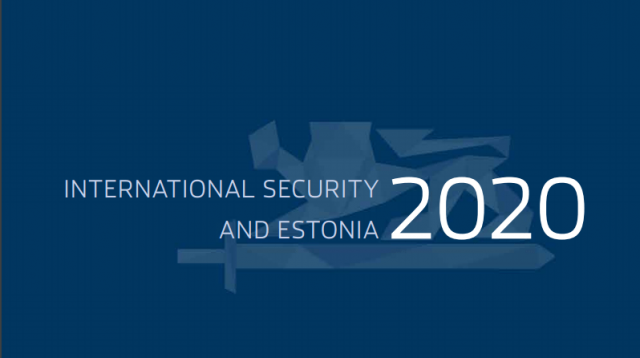Estonian Report on Int'l Security: South Caucasus - Russia’s "Soft Underbelly"
The Estonian Foreign Intelligence Service issued its 2020 intelligence report of the major threats the country faces internationally and regionally. It is not surprising that most of the report is focused on direct or indirect threats from Russia.
The Estonian Intelligence Services thoroughly analyzed Russia's deliberate sphere of influence and the methods the Kremlin uses to destabilize the regions, straightforwardly or from behind the scenes. The comprehensive and wide-ranging report contains chapters on ‘Russian Military Threat’, ‘GONGO’s as instruments of Russia’s foreign policy’, ‘Moscow’s Strategy on Ukraine’, Russian interests in Serbia and Moldova and ‘Russia in the Middle-East’. There are chapters also about Russian interventions in Africa and its precarious relations with China. Among other things, the report patently includes a chapter on Georgia and the South Caucasus, with the heading ‘South Caucasus – Russia’s so-called Soft Underbelly.’
The Intelligence Report distinctly mentions Russia’s paranoid need to interfere with the elections of a sovereign nation, just to maintain their role as a global player.
“Russia wants to show that the West is failing to hold fair elections, which is an opportunity to divert attention away from Russia’s own problems and use the well-worn rhetoric of Western double standards.”
“INTERNET TROLLING IS PART OF RUSSIAN INTELLIGENCE SERVICES’ EVERYDAY ACTIVITIES.” reads the Report, which is nothing unordinary, but coming from a legitimate Intelligence Service from a Baltic state which neighbors Russia, it gives the notion a whole new validity.
The Estonian Report highlights the importance and significance of Georgia for Moscow. It also emphasizes how the Kremlin views the Southern Caucasus region as a whole. “Russia sees the region as a geopolitical buffer zone. Second, South Caucasus is a gateway for transit flows as well as oil and gas pipelines to both Asian and European markets.” reads the Report.
The report says that at the ABL (Administrative Boundary Line), parting occupied South Ossetia and Abkhazia from the Tbilisi controlled territories of Georgia, “2019 was likely the most intense year of the past decade.” The text further reads that: “In September 2019, however, Russian President Vladimir Putin announced that Russia would also fund the modernization and re-armament of the ‘Abkhazian armed forces’.”
One of the most credible and appealing texts from the report, is about the legitimacy of the Ossetian ‘authorities’ controlling the breakaway region. “It is important to recall here that the autonomy of South Ossetian “authorities” is an illusion – they are a puppet government run from Moscow.” reads the text.
The intelligence report also reaches as far as to decipher Russia’s weak and embarrassing instruments of de-escalation, such as the Georgian March. The report reads: “Its mission is to resist the values supposedly imposed on Georgian society by the West, allegedly threatening the very existence of the Georgian people and society. […] It is aimed at rattling public support for joining the European Union and NATO – a foreign policy consensus that has held for nearly 15 years – as well as creating internal tensions and escalating conflict within Georgian society.”
The militaristic or political intentions of Russia are well defined in the extensive intelligence text about Security from a NATO member country. One of the phrases from the Report that must be recollected frequently is the following. “WITH CONSTANT REMINDERS OF THE THREAT OF WAR, THE KREMLIN TRIES TO DISTRACT SOCIETY FROM DOMESTIC PROBLEMS.”
By Beka Alexishvili












